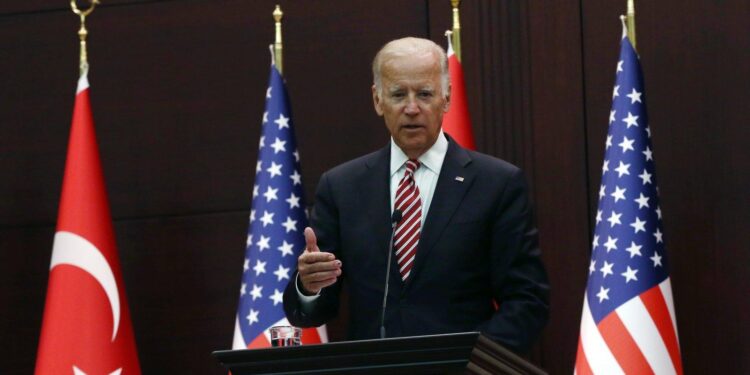The United States has publicly expressed support for renewed dialogue between Greece and Turkey, aiming to ease longstanding tensions in the Eastern Mediterranean. However, analysts and regional observers suggest that Washington’s approach appears to lean more favorably towards Ankara, raising questions about the true balance of U.S. policy in the complex and often contentious relationship between the two NATO allies. This development, reported by The National Herald, underscores the delicate diplomatic dance as the U.S. seeks to promote stability while managing strategic interests in the region.
US Encourages Greece Turkey Dialogue Amid Regional Tensions
The United States has publicly reiterated its support for renewed dialogue between Athens and Ankara as tensions in the Eastern Mediterranean continue to escalate. While Washington emphasizes the importance of diplomacy to de-escalate longstanding disputes over maritime boundaries and energy exploration rights, analysts note a perceived imbalance in US engagement that slightly favors Turkey’s strategic interests. This tilt is reflected in diplomatic overtures and defense cooperation initiatives, signaling a nuanced approach that acknowledges Turkey’s pivotal role in NATO and regional security dynamics.
Key elements in the evolving US stance include:
- Increased military aid to Turkey, signaling sustained strategic partnership despite human rights concerns.
- Calls for a “balanced” dialogue, though Athens accuses Ankara of imposing preconditions that undermine the talks.
- Support for multilateral frameworks in resolving disputes, highlighting Washington’s preference for structured negotiations over unilateral actions.
| US Position | Implication for Greece | Implication for Turkey |
|---|---|---|
| Encourages political dialogue | Opportunity to present legal claims | Pressure to engage constructively |
| Enhances military ties | Concerns over balance of power | Strengthened defense capabilities |
| Supports multilateral forums | Potential for broader alliances | Leverage in regional negotiations |
Analysis Reveals Subtle US Leanings Favoring Turkey’s Strategic Interests
Recent developments in US diplomatic communications suggest a nuanced approach that, while publicly endorsing renewed Greece-Turkey dialogue, subtly aligns with Ankara’s broader strategic interests. Analysts point to Washington’s calibrated language, which emphasizes Turkey’s security concerns and regional influence, signaling a preference for maintaining cordial ties with a NATO ally pivotal to Middle East geopolitics. This tilt manifests through policy statements that prioritize Turkey’s energy exploration rights and military cooperation frameworks, albeit under the guise of fostering equilibrium in the Eastern Mediterranean.
The intricate balancing act emerges clearly in US rhetoric and action, where support for Greek-Turkish negotiations is paired with discreet reinforcements of Turkey’s negotiating position. Key elements illustrating this subtle favor include:
- Selective diplomatic support: High-level visits and joint military exercises with Turkey continue amidst strained regional disputes.
- Energy diplomacy: US acknowledgment of Turkey’s maritime claims, contrasting with stronger criticism of Greece’s expansionist postures.
- Defense agreements: Enhanced arms sales and technology transfers reinforcing Turkey’s strategic capabilities.
| Aspect | US Public Stance | Implication |
|---|---|---|
| Diplomatic Talks | Encouragement for dialogue | Maintains regional stability |
| Military Cooperation | Continued Turkish engagement | Strengthens NATO southern flank |
| Energy Exploration | Neutral statements | Implicit validation of Turkey’s claims |
Experts Call for Balanced Mediation to Ensure Fair Outcomes in Dispute
International mediators and legal experts emphasize the urgent need for a neutral approach in the ongoing Greece-Turkey dialogue. While recent efforts have aimed to rekindle negotiations, analysts warn that perceived partiality risks undercutting trust and derailing progress. Key stakeholders insist that any mediation mechanism should equally weigh the legitimate concerns and historical grievances on both sides to achieve sustainable resolutions.
Among the critical components for effective mediation, experts highlight:
- Transparency: Clear communication channels that allow all parties to express positions freely.
- Equal Representation: Ensuring neither nation dominates the agenda or decision-making process.
- Impartial Moderation: Appointment of mediators with no geopolitical bias or vested interests.
| Factor | Impact on Talks | Recommended Action |
|---|---|---|
| Perceived Bias | Undermines credibility | Independent mediator selection |
| Communication Gaps | Creates mistrust | Regular, open dialogue forums |
| Power Imbalance | Skews negotiation outcomes | Balanced agenda setting |
The Way Forward
In conclusion, the United States’ call for renewed dialogue between Greece and Turkey underscores its strategic interest in promoting stability in the Eastern Mediterranean. However, as The National Herald highlights, the subtle yet discernible tilt toward Turkey in recent US policy signals a complex balancing act influenced by regional security concerns and geopolitical priorities. As tensions persist, the evolving dynamics of US engagement will remain a critical factor shaping the future of Greek-Turkish relations.
















